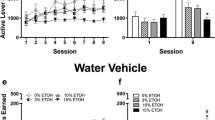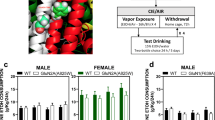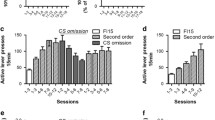Abstract.
Rationale: Dopamine D2 receptors are postulated to play an important role in modulating the reinforcing effects of abused drugs including ethanol. Objectives: This experiment examined operant ethanol self-administration in dopamine D2 receptor knockout (KO) mice and wild-type (WT) mice using a continuous access procedure. Methods: Adult male KO and WT mice were trained in 30-min sessions to perform a lever press response for access to 10% v/v ethanol. After training, the mice were placed in test chambers on a continuous (23 h/day) basis with access to food (one lever press, i.e., FR1), 10% v/v ethanol (four lever presses, i.e., FR4), and water from a sipper tube (phase 1). After 30 consecutive sessions, response patterns were determined for 0, 5, 10, 20 and 30% v/v ethanol (phase 2). Saccharin (0.2% w/v) was subsequently added to the ethanol mixture and responding was examined for 0, 5, 10 and 20% ethanol (phase 3). Results: During phase 1, WT mice displayed higher ethanol-lever responding compared to KO mice. Food lever responding and water intake was the same in both genotypes. During phase 2, WT mice displayed concentration-dependent ethanol lever responding, whereas KO mice responded at low rates regardless of ethanol concentration. WT mice also responded more for food compared to KO mice. Each genotype showed similar water intakes except at the 20% ethanol concentration, where WT mice had lower intakes. During phase 3, WT mice continued to show higher responding for all concentrations including saccharin alone. WT mice also continued to respond more for food compared to KO mice, but drank less water. In each phase, WT mice displayed episodic (bout) responding on the ethanol lever. KO mice did not respond for ethanol in bouts. Conclusions: Reduced responding in the KO mice for several reinforcers including ethanol indicates a more general role for dopamine D2 receptors in motivated responding rather than a specific role in ethanol reinforcement.
Similar content being viewed by others
Author information
Authors and Affiliations
Additional information
Electronic Publication
Rights and permissions
About this article
Cite this article
Risinger, F., Freeman, P., Rubinstein, M. et al. Lack of operant ethanol self-administration in dopamine D2 receptor knockout mice. Psychopharmacology 152, 343–350 (2000). https://doi.org/10.1007/s002130000548
Received:
Accepted:
Published:
Issue Date:
DOI: https://doi.org/10.1007/s002130000548




